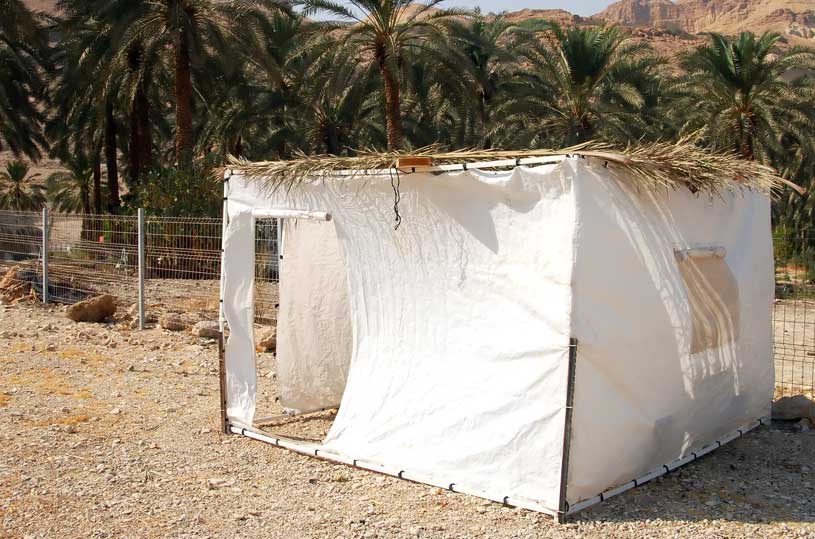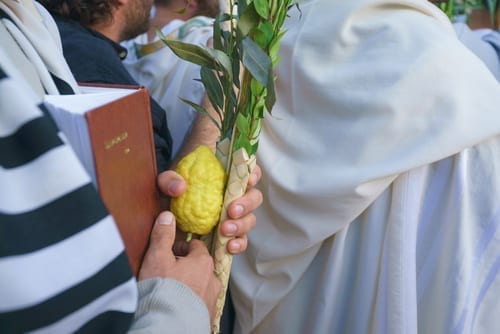Building a sukkah
One may not take wood from public forests or from trees planted in a city to build a sukkah, unless one received express permission from those in charge (otherwise it is theft and one would be performing a commandment through a sin). It is forbidden to recite on such a sukkah the blessing of “to dwell in a sukkah.”
Who can build a sukkah?
Children and women may build it. It is valid if non-Jews built it just before the holiday, but it is preferable that a Jew add something to it.
The status of an old sukkah
A sukkah that was built within a month of the holiday for other reasons — is valid. If it was built to fulfill the commandment of sukkah, it is all the more valid.
A sukkah that was built more than a month before the holiday for other reasons — one should
add something to it and then it is valid. If it was built to fulfill the commandment of sukkah, it is valid but to fulfill the commandment in an even more beautiful way, one should add something to it.
The order of building a sukkah
Preferably, one should build the walls and only then lay the schach on it. After the fact, if one first put up the schach and only then built the walls, the sukkah is valid.
The walls of the sukkah
What may a wall of a sukkah be made of?
The walls of a sukkah may be made of anything that stands stable in a typical breeze without shaking. For example: a stone wall, an iron railing, wood planks, plastic walls etc. It is irrelevant if the wall can absorb tumah (impurity) or not.
A wall made of fabric, nylon or jute curtains is invalid and one does not fulfill his obligation of a sukkah with them. One who recites the blessing “to sit in a sukkah” in such a sukkah has recited a blessing in vain. (This mistake is very common today and many people err in building such sukkahs.)
Creating a wall by a lavod (a law given to Moses at Sinai)
The meaning of the word lavod is “space considered closed.” Any two poles which are not more distant than 3 tefachim (less than 24 cm), even if they are not attached to each other and have air between them — are viewed as if they are actually attached and there is no distance between them. One can use this law, which Moses received at Sinai, to create a “wall”. Therefore, sukkah “walls” can be formed from reed canes, planks, iron poles and wires, as long as the distance between each of them is less than 24 cm (but the wires must be tightly wound so they will not shake.)
An example of a lavod: The green wires that we tie around a sukkah, one on top of another, to hold the sukkah together also create its walls according to the principle of lavod. But one must make sure that the wires are wound tightly and that there is less than 24 cm between each wire.
Height of the wall
The schach does not have to touch the sukkah walls and can be above it. It is sufficient that the height of the walls is valid, which is 10 tefachim (80-100 cm) and then it is considered as if the space above the walls is part of the wall. The schach has to cover the walls. This means that if the walls would go up until the schach, it would touch theschach and there wouldn’t be any space between the schach and the wall.
What schach is valid
There are five conditions for schach to be valid: 1. It has to grow from the ground (it can’t be plastic or metal, etc.). 2. It has to be cut from the ground (it is not presently growing in the ground). 3) It must be unable to absorb tumah (spiritual impurity) so it cannot be a vessel. 4. It must shade most of the sukkah from the sun. 5. It must be directly under the sky (and cannot be under a tree, roof or porch).
Invalid schach
If any of the above 5 conditions are not kept, the schach is invalid. It is also invalid if it has a bad smell or its leaves are still falling off, because there is a concern that a person will leave the sukkah because of these discomforts. Other reasons to disqualify schach: wood planks which are wider than 4 tefachim (because it looks like a normal ceiling, a rule which will be explained later on), stolen schach (which after the fact is valid but one may not intentionally take to use) and if the schach lets in more sun than shade.
What kind of poles/basis can be used to hold up schach?
We already saw that one cannot use for schach anything that absorbs tumah. The sages dispute with Rabbi Yehuda whether it is permitted to put the schach on a base that absorbs tumah. The question is if one can put valid schach over an invalid base that absorbs tumah, such as putting the schach on top of the sukkah’s metal frame.
The sages are of the opinion that this is permitted, but Rabbi Yehudah says it is forbidden. The accepted legal view is that it is best not to use a material that absorbs tumah, but after the fact, if one put the schach on a a material that absorbs tumah, the schach is still valid.
Examples of putting the schach on a material that absorbs tumah: Putting the sukkah schach directly on metal poles (such as the sukkah’s metal frame) or tying the schachdown with cable ties to the sukkah so it won’t fly off in the wind.
To sum up, it’s preferable not to put the schach on a material that absorbs tumah, but after the fact, it is permitted if one did it. It is, however, best not to.
The legal status of putting one base on top of another base that absorbs tumah
We explained above that preferably one shouldn’t put the schach over a material that absorbs tumah, but to put one base on top of another that absorbs tumah is permitted in all circumstances. For example, if one placed wooden poles on a metal frame and connected them with nails or cable ties for the purpose of laying the schach on them, the nails or the cable ties are a base to the base and they are completely permitted.
Everlasting schach
One may use everlasting schach that lasts year after year.
The injunction against a sukkah roof that appears like a normal ceiling
If a person took wooden planks with a width of 4 tefachim x 4 tefachim (32 cm x 32 cm) and covered the whole sukkah with them, we would think that the sukkah should be valid, because it has all the conditions for valid schach, which are: 1. The planks grew from the ground. 2. They were cut from the earth. 3. They don’t absorb tumah.
However, such schach is invalid because the sages made an injunction against planks that have a width of 4 tefachim or more. They were concerned that a person may err and say that just as it is permissible to cover the sukkah with such big planks, so is it permissible to cover a sukkah with a house ceiling (which is of course invalid). This injunction was called the “ceiling injunction” and schach like this is invalid.
Date palm branches
Palm branches may fall under the ceiling injunction, since palm branches may reach a width of 32 cm if they are not cut. Such a branch is invalid and one may not sleep or eat under it. It is best to consult with an expert in these laws concerning this law.
Shade and sun
Most of the sukkah must be covered with shade instead of being exposed to the sun. If it is more sunny than shaded, the sukkah is invalid. Therefore, make sure your sukkah is more shaded than sunny.
If the sukkah is mostly shaded, and only in a small part is it more sunny — it is permitted to sit even under the small part that is more sunny, because it is nullified by the majority. Therefore, one may sit anywhere in a valid sukkah that is more shaded than sunny — including in the place which is more sunny.
The density of the schach (stars)
Ideally, one should be able to see (large or small) stars from between the schach. If one cannot see any stars, the schach is valid. However, it is preferable that one use a little less schach so he can see a few stars. If the schach is so dense that rain can’t penetrate it, the schach is still valid, but it is best to use less schach so when rain falls it can penetrate.
Staying in a sukkah
The sukkah is a remembrance of the Clouds of Glory and the sukkahs where the Israelites lived in the desert. When one sits in a sukkah, he should keep in mind that this commandment is in remembrance of the Clouds of Glory. Every second that a person sits in a sukkah, he fulfills a positive commandment of the Torah, as it says “You shall dwell in sukkahs for seven days.”
Living, staying and studying in a sukkah
The commandment of a sukkah includes: eating and drinking, sleeping, studying, dwelling and generally being in a sukkah.
All seven days a person should try to make the sukkah his permanent residence and his home his temporary residence. He should bring nice dishes into the sukkah just as he does in his own home. Every second that a person remains in a sukkah, he fulfills a positive Torah commandment. Therefore, he should be there as much as possible. The commandment requires that a person’s main residence during the holiday should be in the sukkah, and likewise all his needs should be taken care of in the sukkah, including Torah study.
Who is obligated and who is exempt from the commandment of sukkah?
Some people are obligated to fulfill the commandment of sukkah, and others are exempt. Those who are exempt from the sukkah may sleep, eat and drink outside of the sukkah.
Some people are always exempt from the sukkah (such as children) and some are temporarily exempt, such as one who is experiencing discomfort, an ill person, guards, etc. Therefore, when the reason for the exemption comes to an end, they are obligated to fulfill the commandment of sukkah.
A woman is exempt from sukkah, but she receives reward if she eats, drinks, sleeps or stays in the sukkah, and happy is her portion. However, she does not recite the blessing“to stay in the sukkah” like her husband does.
A minor who reached the age of education, but finds the cold in the sukkah daunting, is exempt from the commandment. One who is in a freezing sukkah and his father or mother are concerned and upset that maybe he will get sick, is considered as one suffering discomfort and he is exempt from the commandment of sukkah.
Eating and drinking in the sukkah on the first night
On the first night of the holiday, there is a special positive commandment to eat a k’zayit of bread in a sukkah. The gemara explains that there is a connection between eating matzah on the first night of Passover and eating in a sukkah on the first night of Sukkot. The amount of bread which the law requires to be eaten is a k’zayit (about 27 grams). Some are more stringent and they eat a k’beitza (about 54 grams). One should preferably eat this amount in 4-5 minutes, but after the fact, 7.5 minutes is also acceptable.
How to eat the required amount on the first night of Sukkot
In principle, the law allows one to eat the bread with other foods (like salads, etc.). Those who want to be stringent on themselves should eat the bread by itself without any additions (as is done on Passover). One should come with a good appetite for the first day’s meal (as is the case with Passover).
Eating and drinking on the rest of the days
On the rest of the holiday (besides the first day) there is no specific commandment to eat a meal in the sukkah, but if one wants to eat, he must do so in the sukkah.
Eating which must be done in the sukkah: a regular meal (above a k’beitza of bread and a k’beitza of other food).
Eating which doesn’t have to be done in the sukkah: a small bite (less than a k’beitza of bread or food, fruit, rice, or drink).
How to say the blessing during a regular meal: When one recites the blessing “to sit in a sukkah”, he should recite out loud while standing: “Blessed are you … to sit in a sukkah” and then he recites the blessing ‘Blessed are you… who brings forth bread from the earth.”
If he forgot to recite the blessing “to sit in a sukkah” and recited the blessing “who brings forth bread from the earth” alone, as long as he is still eating or drinking, he can still recite the blessing “to sit in a sukkah”. But if he isn’t going to eat anymore, he shouldn’t recite the blessing.
One may recite “to sit in a sukkah” several times during the day, depending on how many meals he takes.
One who is stringent for himself to eat and drink every item in the sukkah — will be greatly blessed (but he shouldn’t recite “to sit in a sukkah” unless he is required to).
A person who ate 27 grams of bread in a sukkah and was exempt from reciting the blessing “to sit in a sukkah” but then in the middle of his meal decides he wants to eat another k’zayit of bread or more, has turned his meal into a regular meal instead of just a “small bite” and he should recite “to sit in a sukkah” in the middle of his meal.
When eating a regular meal for which one must recite “to sit in a sukkah”, one shouldn’t eat or drink anything outside of the sukkah during this meal, even water.
One who is unsure whether he recited “to sit in a sukkah” should not recite it. The rule is that where there is a doubt of whether a blessing was recited, we take the lenient view and don’t repeat it. However, it is a good idea to think the blessing “to sit in a sukkah” in one’s heart.
A person who eats a regular meal in the sukkah and plans to recite “to sit in a sukkah”, but cannot sit down from some reason and wants to remain standing while eating, is not required to sit down to recite the blessing since the meaning of the blessing includes being in and not only sitting down in the sukkah.
Women who want to eat and drink in the sukkah, should not recite the blessing “to sit in a sukkah” because they are exempt from the commandment.
One who began to eat and then rain began to fall
If rain fell during on the first night, and a person had to enter his home to recite Kiddush and eat, and then the rains stopped, the Torah commandment requires him to eat ak’zayit of bread in the sukkah.
On the other nights, if he already entered his home and even if he didn’t yet begin his meal, he is not required to return to the sukkah until he finishes his meal, even if the rain already stopped. One who wants to be stringent and return to the sukkah as soon as the rain stops, is deserving of blessing.
Obligation for children to eat in the sukkah
A child aged 5-6 must be educated to keep the commandment of a sukkah. Therefore he should be explained and taught not to eat outside of a sukkah.
One may not let a 5-6 year old child eat a regular meal outside of the sukkah, i.e. bread or pastries more than the amount of k’beitza (54 grams). The rule is that one may not help a minor do a prohibition, and even a woman, who is not obligated in sukkah, should not help a minor do a prohibition.
A child can take a “small bite” outside of a sukkah, i.e. a piece of bread or a pastry less than an amount of k’beitza (54 grams). Similarly for all other foods, such as rice, meat, eggs, vegetables, fruits, etc.
A circumcision during Sukkot
It is proper to carry out a circumcision in a sukkah, and have the festive meal celebrating it in a sukkah. If the event was held in a banquet hall — one may not have a regular meal in it, because a regular meal (bread and pastries more than 54 grams) must be eaten in a sukkah. They should only serve food which does not need to be eaten in a sukkah, like salads, etc.
Sleeping in a sukkah
It is obligatory to sleep in a sukkah and the obligation to sleep in a sukkah is actually more stringent than to eat in it, because a “small bite” is permitted outside of a sukkah, but a “short nap” outside of a sukkah is forbidden.
Intimate relations
It is a good idea for a woman to sleep with her husband in a sukkah, if possible. There is no question of impropriety and he may even have relations with her at the appointed time. This in no way shows any disrespect for the sukkah’s holiness. As the sages learn out: “Dwell [in a sukkah] as if it is your regular residence.” During the holiday, a sukkah is a person’s home.
If one’s wife finds it difficult to sleep in a sukkah, the husband should sleep there alone.
Who has to sleep in a sukkah
Only men are obligated to sleep in a sukkah. Children who are of the age of education, it is proper to educate them in this commandment (if they can understand it).
Who is exempt from sleeping in a sukkah
One who feels discomfort when staying in a sukkah (we will soon see what constitutes “discomfort”), women and small children, and everyone when rains fall (as will be explained below).
One who feels discomfort in a sukkah is exempt from staying there
The Torah did not obligate remaining in a sukkah when a person is miserable there. There are a number of cases where a person is considered as suffering discomfort that exempts him from having to stay in a sukkah. (It is interesting to note that the Torah only exempts a person experiencing discomfort in a sukkah from the commandment, but doesn’t exempt one experiencing discomfort from other commandments.)
Situations when a person is considered to be experiencing discomfort:
* when there are many flies or mosquitoes, snakes and scorpions, or a very bad odor in the sukkah which is bothering him
* when a person is sick even if his life is not in danger including if he has a headache, toothache, backache, infection in a limb, etc. and all the more so when he has a dangerous illness
* when rain falls, even if it is only drizzling
* when the weather is harsh, for instance, if there is a storm, heat wave, or cold wave.
* when he has to help his wife take care of the kids at night (if the young children are crying and/or a child is sick)
* if his wife is afraid to sleep alone at home — in this case the husband is considered to be in a situation of discomfort.
* A minor who has reached the age of education and finds it difficult to sleep outside because of the cold.
There are situations where a person is exempt from living in a sukkah and he may not even be stringent with himself and live there despite being exempt, for instance, when rain falls. There are also situations where a person is exempt from living in a sukkah but he may be stringent with himself and live there, such as in the other situations listed above.
Additional rules concerning “discomfort”
When the weather is windy and cold, a person should dress well and cover himself with a blanket as he would do in his home if he felt cold. He should not easily exempt himself from the important commandment of living in a sukkah.
If he has to leave a sukkah because of discomfort, he should not leave it with “a kick”, but should go slowly and in a subdued manner.
In all the cases mentioned above in which he is exempt from a sukkah, if the situation that caused him discomfort ends, he is obligated to return to the sukkah. (For instance, if the mosquitoes or snake left, if his sickness went away, if the rain stopped, or if his wife no longer needs him.)
Forbidden and permitted acts in a sukkah
One may not wash dishes and plates or change diapers in a sukkah.
One may smoke and wash hands there.





